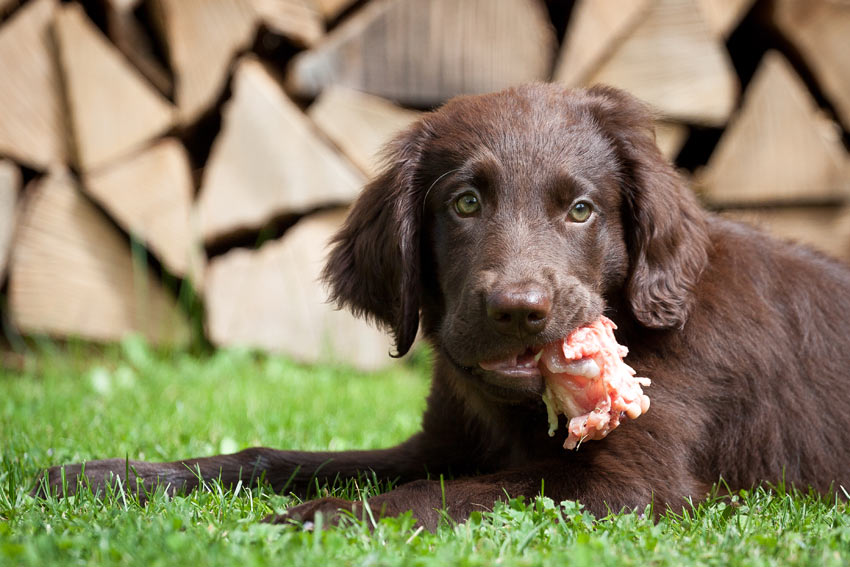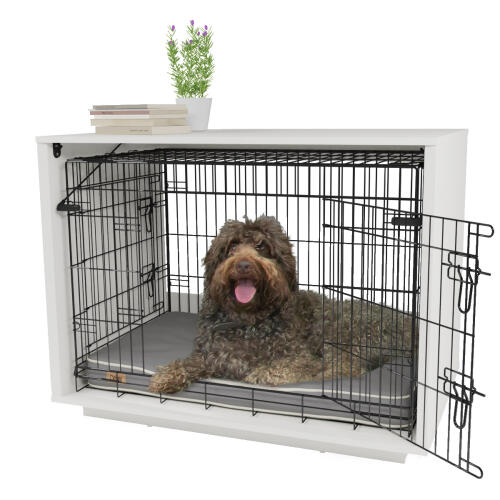
For decades, the debate has raged on about what's best for our canine companions: kibble or raw meat? As descendants of wolves, dogs have a natural affinity for meat, but the evolution of commercialized dog food has left many questioning, should dogs eat raw meat?
History of canine food
Before the advent of commercialized dog food, our four-legged friends dined similarly to their wild ancestors, the wolves. In the wild, their diet primarily consisted of raw meat, bones, and occasional vegetation scavenged from the environment. This natural, protein-rich diet is what kept wild dogs hearty and healthy and aligned with their evolutionary needs.
Is raw meat ok for dogs or not?
The raw dog food diet has garnered attention for its potential benefits. Advocates argue that it mirrors a canine's ancestral diet and promotes healthier coats, improved digestion, and increased energy levels. Many pet owners consider a raw meat diet natural and nutrient-dense and believe it’s the easiest and most cost-effective way of providing 80% meat for their companions. To get the equivalent amount of protein in a dry dog food or wet dog food diet you would have to spend a lot of money on the most expensive varieties.
But, some critics raise concerns about feeding raw meat to your dog. When the meat is not sourced properly or of high quality, it can be more harmful than helpful to your dog. Poor quality raw meats can have bacterial contamination, unbalanced nutrition, and carry the risk of bone-related injuries. So always be sure you’re sourcing your raw meats from reputable butchers.
What raw meats are safe?
When considering a raw diet for your dog, selecting the right meats is crucial. Fresh, high-quality meats that are sourced from a reputable butcher will provide a diverse array of essential nutrients for your canine companion. To get all of the nutrients that a dog requires you should feed your dog most parts of the animal. Here is a list of animal parts that you can source from your butcher:
Liver
As well as being an excellent source of protein, iron, zinc and folate, liver is also a good source of vitamins A, C, D, E and K, as well as B6 and B12. It is by far the most nutritional organ, which is why it should never be left out of your dog’s raw meat diet. Liver should make up 5% of your dog’s raw meat diet.
Kidney
Kidney is a great source of protein, iron, zinc and folate too. It also provides your dog with essential fatty acids and vitamins A, D, E and K, as well as all of the B vitamins.
Heart
Heart is one of the most nutritional muscle meats in a raw dog food diet. It’s rich in iron and zinc, and is a great source of thiamin, vitamin B6 and B12, phosphorus, copper and selenium. But, heart is also quite high in cholesterol, so shouldn’t be fed to your dog too often.
Tripe
Tripe is one of the highest quality meats of the raw dog food diet and should definitely be the first meat you try when beginning your dog on a raw diet. Not only is tripe a good source of protein, but it’s also low in fat, making it an excellent choice for your dog’s dinner. Tripe contains key vitamins such as A, B, C, D and E, as well as omega-3, essential fatty acids, calcium and phosphorous. And it’s full of digestive enzymes and bacteria that help with digestion.
Brain
Brain is considered more of the dessert of the raw food dog diet. While it’s high in protein and omega-3 fatty acids, it’s not a good source of vitamins or minerals. So whether you’re just starting your raw meat dog diet or well on your way, it’s best to give brain to your dog as an extra rather than a staple.
Taking it slowly
Transitioning your dog to a raw meat diet should be a gradual process. Begin by introducing small amounts of raw meat alongside their regular food, and observing how they respond. Slowly increase the ratio of raw to regular food while monitoring for any signs of digestive upset or allergies.
Don’t limit your dog’s raw meat diet to only these five ingredients – take whatever your butcher has to offer as long as it follows the outlined guidelines and is safe for your dog to consume. You can try all sorts of strange parts of the animal like lungs, chicken feet, beef trachea, pig guts and trotters, and even pizzles (you might have to google that one!) Disgusting as it may sound to you, dogs love it all.
Guidelines to follow
While raw meat can offer numerous benefits, it's essential to follow certain guidelines to ensure your pup enjoys the new plan.
- If you switch your dog’s diet to one based on raw meat, ensure you primarily buy lean muscle meat, internal organs and bones from beef, lamb, pork, chicken and rabbit.
- Source all of your raw meats from a reliable butcher who offers high-quality meats and keep the meat refrigerated at all times once purchased.
- For added health benefits, be sure to include foods like oily fish and eggs.
- Adding yogurt that contains probiotic bacteria can help with digestion but keep an eye on your dog when feeding him dairy products because some dogs can be lactose intolerant.
- Avoid feeding cooked bones any meat that’s past its prime to prevent potential health risks.
- Keep the raw meat meal balanced - alternate feeding organ, meat and bone with the goal of feeding your dog 5% liver, 5% other organs, 10% edible bone and 80% meat (including tripe), fat and ligaments.
Omlet and your dog’s needs
In a world where the debate on dog diets is ongoing, Omlet understands the intricate dietary needs of our canine companions. We don’t just cater to one-size-fits-all solutions but strive to create products that align with the individual needs of every dog. With our wide range of pet products like customisable comfy dog beds and luxury dog crates, Omlet creates designs to meet the diverse needs of every furry friend.






Comments
Ash, 13 September 2020
Insanely comprehensive :) Thank you so much, Now I have something to read during the holidays. This will take a while but well worth it like always You can read another one here
Daril, 12 May 2019
Diet for a whippet